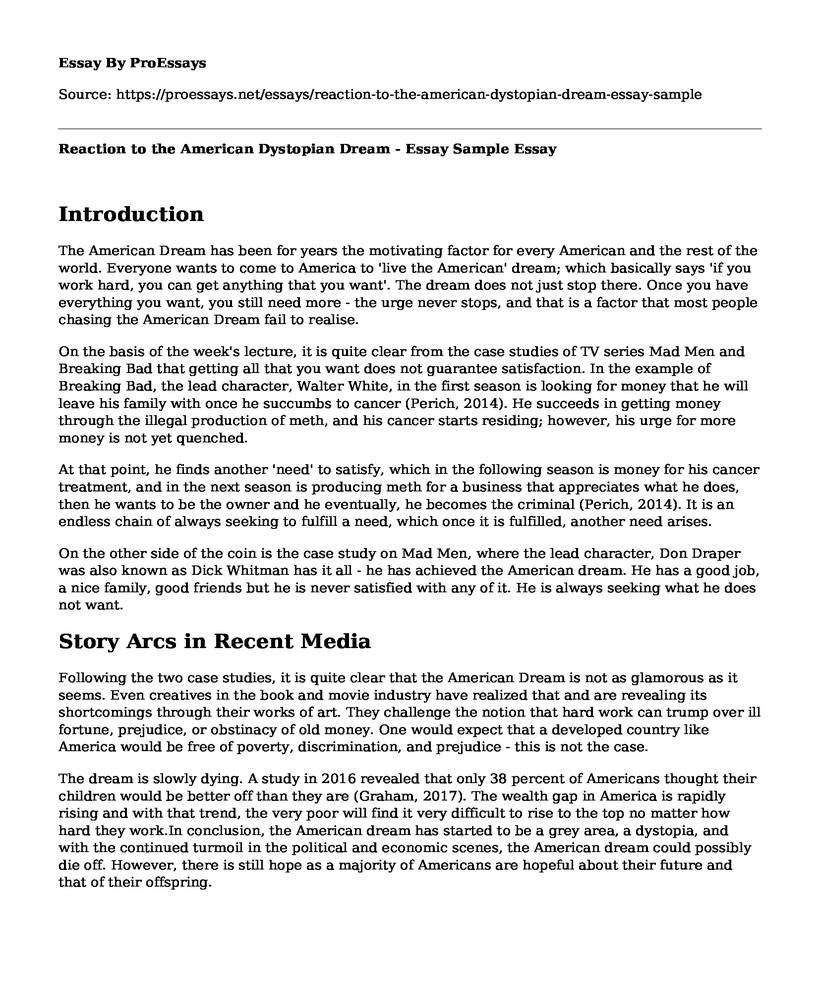Introduction
The American Dream has been for years the motivating factor for every American and the rest of the world. Everyone wants to come to America to 'live the American' dream; which basically says 'if you work hard, you can get anything that you want'. The dream does not just stop there. Once you have everything you want, you still need more - the urge never stops, and that is a factor that most people chasing the American Dream fail to realise.
On the basis of the week's lecture, it is quite clear from the case studies of TV series Mad Men and Breaking Bad that getting all that you want does not guarantee satisfaction. In the example of Breaking Bad, the lead character, Walter White, in the first season is looking for money that he will leave his family with once he succumbs to cancer (Perich, 2014). He succeeds in getting money through the illegal production of meth, and his cancer starts residing; however, his urge for more money is not yet quenched.
At that point, he finds another 'need' to satisfy, which in the following season is money for his cancer treatment, and in the next season is producing meth for a business that appreciates what he does, then he wants to be the owner and he eventually, he becomes the criminal (Perich, 2014). It is an endless chain of always seeking to fulfill a need, which once it is fulfilled, another need arises.
On the other side of the coin is the case study on Mad Men, where the lead character, Don Draper was also known as Dick Whitman has it all - he has achieved the American dream. He has a good job, a nice family, good friends but he is never satisfied with any of it. He is always seeking what he does not want.
Story Arcs in Recent Media
Following the two case studies, it is quite clear that the American Dream is not as glamorous as it seems. Even creatives in the book and movie industry have realized that and are revealing its shortcomings through their works of art. They challenge the notion that hard work can trump over ill fortune, prejudice, or obstinacy of old money. One would expect that a developed country like America would be free of poverty, discrimination, and prejudice - this is not the case.
The dream is slowly dying. A study in 2016 revealed that only 38 percent of Americans thought their children would be better off than they are (Graham, 2017). The wealth gap in America is rapidly rising and with that trend, the very poor will find it very difficult to rise to the top no matter how hard they work.In conclusion, the American dream has started to be a grey area, a dystopia, and with the continued turmoil in the political and economic scenes, the American dream could possibly die off. However, there is still hope as a majority of Americans are hopeful about their future and that of their offspring.
References
Graham, C. (2017, June 20). Is the American dream really dead? from http:// www.theguardian.com/inequality/2017/jun/20/is-the-american-dream-really-dead
Perich, J. (2014, May 3). The Hole in the Middle: Mad Men and Breaking Bad- Overthinking it. pp. 1-4.
Cite this page
Reaction to the American Dystopian Dream - Essay Sample. (2022, Nov 29). Retrieved from https://proessays.net/essays/reaction-to-the-american-dystopian-dream-essay-sample
If you are the original author of this essay and no longer wish to have it published on the ProEssays website, please click below to request its removal:
- Essay Sample: The Man Who Can Live Alone Is Either an Animal or a God
- Code of Ethics in Management Essay
- Difference Between Rule Ethics and Situation Ethics in Moral Decision Making
- Nietzsche's "On Truth and Lies in a Nonmoral Sense" and Wallace's "This Is Water" - Paper Example
- Paper Example on Ineffective Strategic Change Due to Environmental Determinism
- Essay Sample on Religion and Morality
- Ethics Training Programs: Instilling Right Morals in Organizations - Essay Sample







